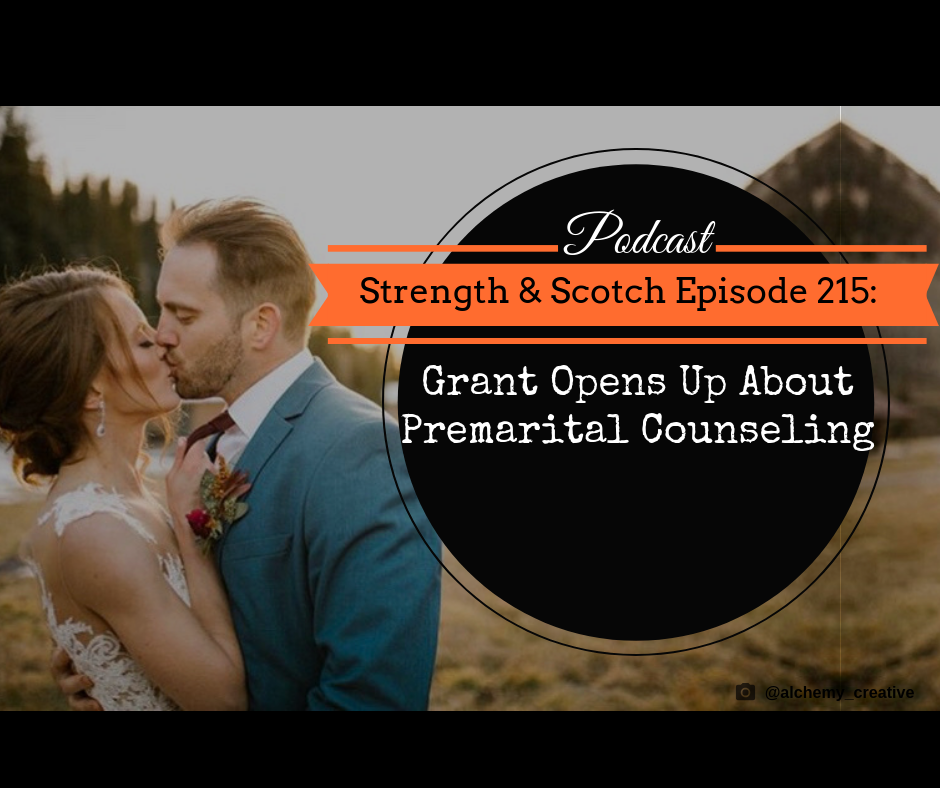SS 215 – Grant Opens Up About Premarital Counseling
Episode 215 Show Notes
This week we’re yet again changing things up: with this week’s episode featuring Grant and his wife Elizabeth. The newlywed couple opens up about their personal relationship – discussing their journey with premarital therapy. Tune in to find out how to better communicate and develop stronger relationships in that 5th pillar of health.
[02:50] The Four Main Pillars of Health (Plus One!)
Grant enumerates the four pillars of health, namely: Nutrition, Fitness, Stress, and Sleep. However, Grant argues about the fifth main pillar, that being sex. Really, this boils down to human connection.
By connection, this could refer to a community, or to strangers. It’s that human interaction that boosts your self-esteem and could reduce stress and help you get through tough times. That being said, it makes you healthier.
[04:15] Strengthening the 5th Pillar
Grant points out that the fifth pillar has a lot to do with their marriage. (Grant and Elizabeth just got married two months ago!) On this podcast, they want to talk about how they strengthened this fifth pillar before they decided to enter their marriage.
To strengthen this pillar, Grant and Elizabeth decided to do something to prepare for this next chapter in their life. Enter premarital therapy.
People may hear this and think they’re having problems. It’s so easy for people to think about therapy or counseling as if there’s some kind of baggage attached to it when it actually isn’t necessarily true. People figure that if you’re going to therapy or seeing a counselor, there HAS to be something wrong.
But Grant and Elizabeth decided to do it without much being wrong at all. So whose idea was it? Grant.
Grant had a short-term marriage previously, which actually took him by surprise. So he wanted to do whatever he could to take care of the marriage.
[08:12] Some Interesting Statistics
But before that here are some statistics:
According to Brigham Young University, premarital counseling decreases the likelihood of divorce by 50%.
8 hours is the average time a couple spends in premarital therapy.
93% of Americans have a life goal of being in a happy marriage.
40% of married people reported they’re happy with their lives. (Now, if compared to unmarried people, only 18% say they’re happy with their lives.)
There’s really something about this 5th pillar that truly matters to people’s happiness and well being. That being said, one of the best ways to succeed in relationships is premarital therapy.
[13:10] The Pros and Cons of Premarital Therapy
Elizabeth thinks they got a lot out of their premarital therapy and feels like they had more in-depth nitpicky issues, and not really big issues. For her, the biggest thing they worked through was communication. They talked about the AM/FM frequencies so when she’s an AM and Grant is an FM, their emotional states are different so it’s harder for the other person to hear the other person. For instance, Grant is the more logical type while Elizabeth is the more emotional type.
What’s hard is when one person brings up a touchy issue that brings tension in the relationship and could cause a fight that they just fought about a week ago. However, this can still be beneficial since the counselor can keep the couple in check so that they have to hear each other out.
[15:48] Finding a Good Therapist
Elizabeth explains it’s really not about liking a therapist, but rather what do they bring to the table? Do they just let you talk the whole time without offering feedback? Their therapist was good at pointing things out and keeping the conversation balanced. He explained things to them as they were happening by sharing what he was seeing in what the other person is feeling and breaks it down. If they’re not communicating well, he’s able to translate between Grant and Elizabeth if they’re not really getting it.
[17:00] Premarital Therapy as Preventative Maintenance
You can learn skills during therapy that may allow you to change and adjust to the “frequency” of the other person. By practicing those skills, you can bring that to any situation. Elizabeth stresses the biggest thing in relationships and premarital counseling and all that is communication and breaking it down and finding the spots where you have little holes in your communication with one another.
[18:25] Should They Still Continue Now That They’re Married?
Elizabeth thinks there is always something to talk about, dissect and improve. For instance, Elizabeth could be spending too much time doing something and Grant would feel neglected. Even if it’s just a small problem, it’s still something to work on.
[19:20] The Stigma Attached to Therapy
Elizabeth reveals no one ever talked about it as she was growing up and living in Iowa. There’s a stigma to it and often don’t see it as a proactive measure.
A lot of times, we’re stressed over little things in life. You could greatly improve your life just by nitpicking at the little areas where you’re not happy in your life. If you let all the little areas fall apart, it can spiral into a larger problem.
Moreover, Grant says that amidst the stigma, it would still be easier for people to go to therapy. He wonders whether what’s even harder is the ability to admit that you have problems.
[21:37] Getting Rid of the Stigma
Elizabeth recommends that people talk about it and make it normal. In fact in Iowa, premarital counseling is normal because a lot of people in the Midwest go to a priest.
The reason Grant actually brought therapy up with his wife was that he has a friend who went through premarital counseling with his wife at their church and then they got to do a weekend retreat along with ten other couples who were about to get married. And for him, it was the greatest thing for his marriage ever. Since then, it totally stuck with Grant!
[24:00] The Role of Religion and the Priest
Grant explains that one of the things that kept coming up on a lot of these stats is the “absence” of religion because the role — that both the priest and the church played in people’s relationships and lives — is just absent. Elizabeth adds that people who want to have that experience have to go to a therapist.
Grant read an article that the number one most important thing in couples counseling is “the sooner, the better” — a lot of people wait to go to couples counseling when they start having problems.
If you start communicating and figuring out how to get through tough times, you’re better able to plan for it. It’s about knowing how to communicate through those times instead of shutting down. It’s about being sensitive to the other person.
[26:00] What If You Can’t Find a Good Therapist: Talk
Grant suggest finding a “safe zone” time where you set an hour a week with your significant other for you to talk about things that bug you. Elizabeth emphasizes that you have to be mindful of how you approach your partner. All this being said, you have to have these kinds of conversations so things don’t blow up. One way to do that is to have that conversation where you’re allowed to say how you feel.
Grant adds men should be able to express the things that annoy them too just as much as women need to express that she’s annoyed when men leave the toilet seat up.
Another thing you can do if you can’t afford a therapist is to read books on couples and communication for guidance.
[29:33] Don’t Wait
Grant and Elizabeth both agree that if there’s one major takeaway from this episode is — don’t wait. When people think there’s no longer any spark and think the relationship is over, is the time when you actually have to go put the work in and where therapy can come into play. If you do start feeling that, address it right away. Otherwise, brushing it off and letting it build would only brew resentment.
Grant firmly believes that happiness comes from within you so don’t set unrealistic expectations in your marriage. Don’t put it off and let it fester. The sooner you start to open the conversation up with your partner, the easier it is to keep that pillar strong. That way, you prevent having those cracks in the middle and letting it fall.
Imagine you could be taking care of your sleep, stress, food, and have a great physique but you could be living a miserable life because you’re missing that connection with your spouse. This is going to detract you from your health as well. Alongside, your partner would find it hard to be happy in a relationship when they know you’re not happy.
[32:44] Puzzle on a Bottle
Elizabeth actually gave Grant a bottle of scotch for Christmas — with a twist! She bought a puzzle for him thinking that he had to earn it. It was pretty hard that Grant gave up. The puzzle is made by a company called Don’t Break the Bottle. So the bottle is one that Grant finds unique because it’s heavily peated. The brand is Ben Romack and the reason Elizabeth pick it up right off the shelf is that it was labeled peat smoke. She thought that as long as it’s smokey then it shouldn’t taste that bad.
In fact, when Grant and Heavey started the show, they hated Laphroaig the first time they had it. But when Elizabeth tried it, she took it right away!
[37:30] Final Thoughts
Ultimately, Grant wishes to share with everyone that premarital counseling has a lot of benefits and it does play a role in mental health which leads to physical health. Elizabeth adds that the more you talk about it, the more it becomes a normal thing. Look at mental health as just a part of your health. It’s not like you’re crazy. Take that step to make your relationship better and improve your health for the future.

Check out the gear page for everything Strength & Scotch! You’ll find a listing of all the supplements and other programs we’ve discussed on the show as well as our killer t-shirts!

